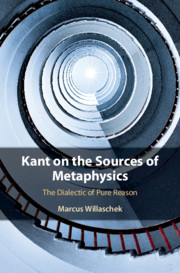Book contents
- Kant on the Sources of Metaphysics
- Kant on the Sources of Metaphysics
- Copyright page
- Dedication
- Contents
- Note on References and Citations
- Preface
- Introduction
- Part I From Reason to Metaphysics
- Part II The Other Side of the Transcendental Dialectic
- Postscript
- Bibliography
- Index of Names
- Index of Subjects
Introduction
Published online by Cambridge University Press: 09 November 2018
- Kant on the Sources of Metaphysics
- Kant on the Sources of Metaphysics
- Copyright page
- Dedication
- Contents
- Note on References and Citations
- Preface
- Introduction
- Part I From Reason to Metaphysics
- Part II The Other Side of the Transcendental Dialectic
- Postscript
- Bibliography
- Index of Names
- Index of Subjects
Summary
The Introduction explains the two major aims of the book. First, the book will offer a novel interpretation of the Transcendental Dialectic that isolates its constructive side, Kant’s account of the rational sources of speculative metaphysics (concerning the soul, the world as a whole, and God), and distinguishes it clearly from its destructive side, Kant’s critique of this kind of metaphysics. Second, it will reconstruct, and where possible defend, a Kantian account of the rational sources of metaphysical thinking. In particular, it will argue that Kant is right in claiming that metaphysical speculation arises naturally out of principles that guide us in everyday rational thought. As the book will argue, Kant gives us good reason to think that discursivity, iteration, and striving for completeness are fundamental features of rational thinking and that, taken together, they give rise to a specific kind of metaphysical speculation. This is a distinctive and original perspective on metaphysics that deserves to be taken seriously in the current metaphysical and meta-metaphysical debates.
Keywords
- Type
- Chapter
- Information
- Kant on the Sources of MetaphysicsThe Dialectic of Pure Reason, pp. 1 - 16Publisher: Cambridge University PressPrint publication year: 2018

